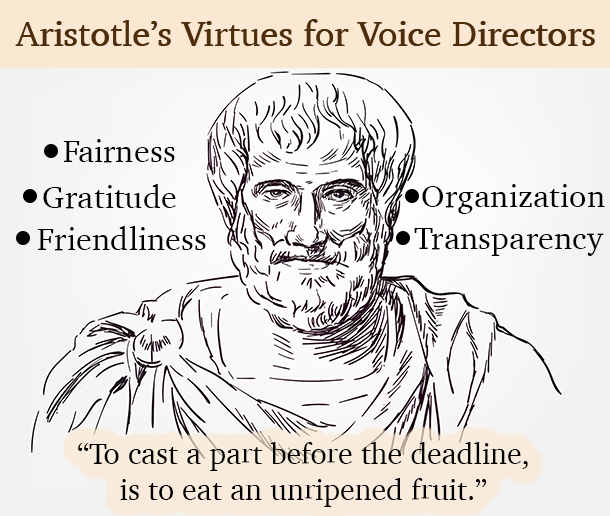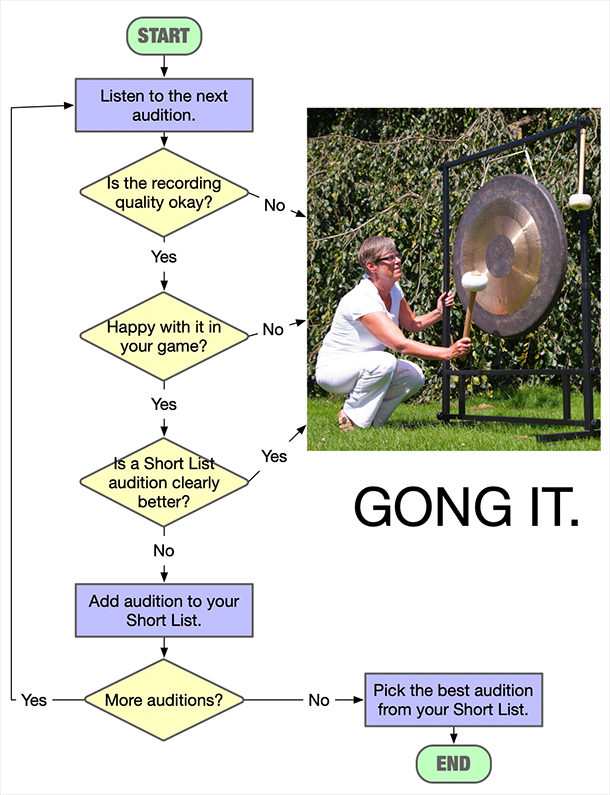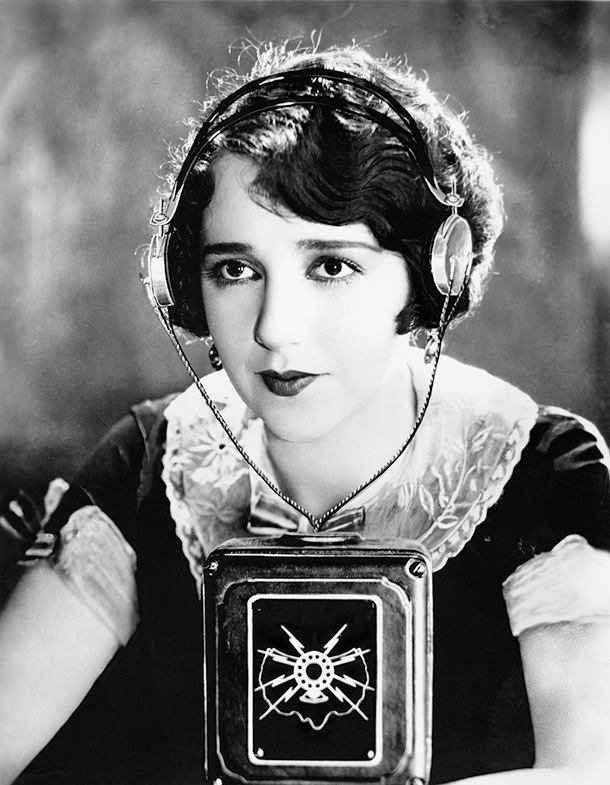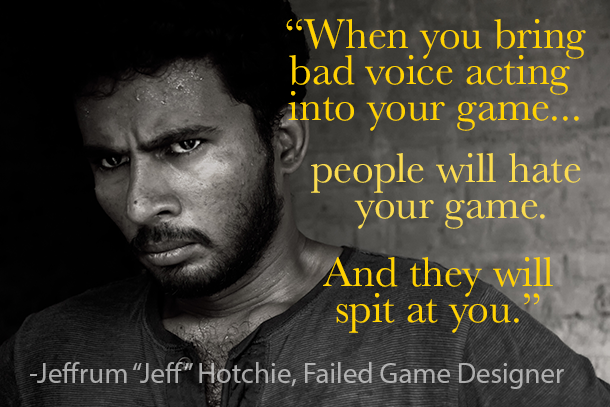Trending
Opinion: How will Project 2025 impact game developers?
The Heritage Foundation's manifesto for the possible next administration could do great harm to many, including large portions of the game development community.

Featured Blog | This community-written post highlights the best of what the game industry has to offer. Read more like it on the Game Developer Blogs or learn how to Submit Your Own Blog Post
Once voice actors are auditioning for parts, don't be swayed by the headshots. There are so many pitfalls to cover in part 3. Make solid choices, and maybe, just maybe... your game will shine.

I covered quite a bit in the first two articles of this series:
Part 1 – Should you put voice acting into your game?
What level of quality do you need to achieve in the voice acting?
What are the pros/cons of commissioning versus using a casting call?
How much should you expect to pay?
How do you estimate the cost and time of adding voice acting for your game? (I included a “fill in the blanks” spreadsheet tool for your use.)
Part 2 – How to get actors to audition for your game by announcing a casting call?
What preparation is needed before your announcement?
What content should be written to describe your game and the parts in it? (I provided a template document for your use.)
What should a casting call announcement include?
Do you want to accept auditions through email or your Discord server?
How many auditions do you really want?
Where do you post your casting call?
In Part 3 (this thing you’re reading), I’m covering what happens next after your casting call announcements have been made. You’ll be coordinating and reviewing auditions to make casting decisions. This is more than a mechanical process to follow. To get the best results, you need to be in the right frame of mind when dealing with people. So let’s talk about that first.
The Necessary Virtues
You’ll have to pardon my strange sense of humor. It’s the only way I can keep myself entertained!

Prepare yourself to be all these things:
Fair – Parts should be awarded on the basis of the auditions. You’ll consider every audition.
Friendly – You’ll be a pleasant and accessible human being to the actors who are spending time on your project.
Appreciative – Never take for granted the effort actors are expending.
Organized – You’ll do the work to set up clear instructions and other content. You’ll support actors by answering questions.
Transparent – Your content will describe the process clearly. You’ll describe the reasons for different decisions you make.
As actors pop up, eager to audition, you might start feeling like a big fish. Don’t let a little attention go to your head.
Some actors will be sincerely interested in your project at a creative level. For others, you are just one little gig in a busy day. You should accommodate people with all kinds of personalities and goals. Never try to make people impressed with you or your project. Instead, aim to treat all comers well and walk away from the process with excellent voice recordings for your game.
Undue Influences

The audition content should be the main thing used for making casting decisions. There are a handful of other things that are okay to use to a lesser extent. You could think of them as tiebreakers.
Voice reels and other demo content
Resumé
Professionalism in how actors communicate. This is less about specific language used, and more about empathy, respect, and demonstrated industry knowledge.
But you don’t want to be influenced by things like this:
Attractiveness / head shots (it’s a voice part, right?)
How much you like their personality
How much they want a part or how hard they are trying
Things happening in their personal lives
Side favors/separate transactions (e.g. an actor kindly promotes you on their Twitter feed)
Offers to voice a part for free or for less money than offered
Keep it simple. You want the best actor for each part. This is what will give your game excellent voice acting and protect your reputation as a producer/director.
Answering Questions
It’s common for actors to send questions in email or DM, particularly about parts. You should avoid clarifying a part description if it could devalue earlier auditions. Here’s a conversation that I’ve had about ten versions of in the last month.
JohnnyDangerVA: Hey, on the Police Commissioner part, I’m feeling that character has a need for personal redemption with a veneer of nihilism coating it all. What do you think?
Me: I want to leave room for your creativity in the performance. I don’t want to say more than what is already there in the part description. Also, feel free to do more than one take in your audition if you have different ideas to present.
When I respond like this, I’m being sincere, but also choosing my words very carefully. If I give Johnny some extra piece of advice that other actors don’t have, then I’m not being fair to everyone.
Somebody might ask a question that isn’t about clarifying a part, e.g. “If we’ve already submitted one audition, can we submit another one?” Of course, answer that person, but make sure the same information is available in your public content (casting doc, instruction posts on Discord) so that everyone auditioning has it.
Even Clarifying Parts Publicly is Dangerous
But what about clarifying a part description publicly? The rationale would be that all actors have access to the same information this way, and you will get more targeted performances from the process.
Be so careful with this.
The problem is that you can devalue the auditions that came before you make the clarification. It often takes 30 minutes or longer for an actor to put together an audition. If you change something significant about the part description, it can be like throwing their work into the trash.
Don’t change a part description if you feel you can still get the audition performance you want without changing it.
Never try to casually steer auditions in one direction with public comments, e.g. “I really like the auditions with a British accent.” This is like trying to change the part description in a sneaky way. You’re still devaluing all the auditions that came before your comments.
If You Truly Must Change a Part Description
No, I’m not a Catholic priest, but you screwed up and here is what you must do now:
Communicate clearly and quickly that there is a problem with the part description you will fix, and that actors should wait to post auditions. Essentially, you put a “Closed for Maintenance” sign over your audition.
Fix the part description to what it needs to be. This should be done in minutes, not hours, and definitely not days.
Increase the pay on the changed part. This can help entice actors to resubmit auditions. It also shows you giving something back for people’s time you’ve wasted.
Apologetically announce that corrections have been made and you are again accepting auditions.
Offer something to actors who have already posted auditions. It could be a copy of your game after it’s released or free promotion of the actors in one of your channels, e.g. Twitter, Facebook, Twitch.
Can you see why you might want to take extraordinary care to write good part descriptions to avoid this trouble?
I’ve made the mistake of posting an insufficiently clear part description. Here’s the Twitch stream where I promoted three early auditioners to help make up for their wasted time.
Don’t Close Auditions Early
I already gave this advice in part 2 along with the reasons. A reminder: you must accept auditions up until your posted audition deadline and honestly review them all. It does not matter if Angelina Jolie is the first actor to audition. You wait for the deadline. You listen to all the auditions, and then you (probably) give the part to Angelina Jolie. This is for your benefit in having a better selection. But it’s also to meet the expectations of actors who are scheduling their time to audition for you. You will upset actors and gain a bad reputation if you close auditions early.
Extending Audition Deadlines is… (sigh) Okay
It won’t be the most popular choice for those who already auditioned, but it is acceptable to extend auditions. Avoid doing this if you can. How you handle it depends on the reasons for extending the audition.
Your part description needs changes to get the audition performances you need. See the previous “If You Truly Must Change a Part Description” section. Basically, you screwed up and need to do some things to make it right.
You did not get a large enough response. Communicate that you are extending the audition deadline to get more responses. Express your appreciation for the actors who have posted auditions, and be clear that their auditions will be considered along with any newer ones.
You did not get auditions that matched the quality you wanted. Same as above, but consider also increasing the pay amount for that part if it seems as though the part is more challenging to cast than others.
Can you see the pain in the scenarios above? If you have to extend deadlines, then do it. But handle with care.
Ideally, you write great part descriptions that don’t need changes. And you handle the casting call announcement well to bring in plenty of auditions.
The Midway Boost
Suppose half a week goes by from the start of your casting call, and you have… one audition. You’re worried. As appreciative as you are of the actor who posted an audition, you’d hoped for more and better options.
At this point, you should post another casting call announcement to a different venue. See my list of places to post in the Part 2 article. Keep in mind that it’s possible to be swamped with auditions, and that’s bad when you’re obliged to review them all. There’s a little bit of art and whole lot of luck in getting the response you want. Keep the following guidelines in mind:
You’re aiming for 10-20 auditions per part.
About half of your auditions will come in on the weekend.
With public auditions (Discord) sometimes actors don’t want to be the first to post.
Start checking for low audition counts a couple days after your casting call announcement and react as needed.
Total Crickets
For the “I don’t want to post first” problem that happens with public auditions, you can record your own example audition to show a pattern, being clear that it is just an example and does not clarify the part. You can also just make a post like, “is anyone planning to audition for this part?” It shouldn’t take much to break the ice here.
But if it does, then maybe you wrote the part description in some way that offends or scares people off. I did that once by including an R. Kelly song as part of an audition. I was only considering how the particular song, Trapped in the Closet, matched up well to what was needed on a part. But the choice understandably made some people not want to audition. After I substituted a different song, the audition response was more normal.
Judgment Day

After you’re past the audition deadline, you stop accepting auditions. On Discord servers, you can create a “Closed Auditions” category with no posting permissions and just drag your part channels into it. Be strict about your deadline, any audition posted before the deadline should be considered. What about an audition posted five minutes after the deadline? I don’t recommend grace periods as they invite “grey area” disputes.
If you set up your casting call well, you’ll have an amount of auditions that feels a little overwhelming, but manageable.
Now it’s time to listen to all the audition recordings and make a casting decision. If you’ve got a lot of auditions to go through, it pays to put some methodology around your review. The way I like to review auditions is shown in the diagram below.

I’ll explain a few things.
“Gong it” – (from Chuck Barris’ The Gong Show) – As soon as you know the audition won’t be the one you pick, stop listening to it. It’s important to reduce your evaluation fatigue so you can hear performances well. There’s also heartbreak to avoid when an actor performs beautifully, but one thing like bad recording quality disqualifies them. As soon as you know an audition won’t be the one, just move on.
“Short List” – You keep a list of contenders from your first pass through the auditions. In a second pass, you go over just the auditions in your Short List to pick who to cast.
Judging Audio Quality
Here’s my quick, subjective guide to judging audio quality. First, put on some headphones.

Cheap ones are fine. While playing the recording, turn the volume up to “comfortably loud”. If you feel tense when listening, that’s too loud. You have to adjust the volume for each recording.
Gong the recording if you hear any of these problems:
Reverberation.(Explanation video) If it sounds like the actor is recording inside of a room, that’s reverb. This is the most common recording quality problem you’ll encounter. If you only hear reverb on parts of a performance where the actor speaks loudly, you still want to gong the audition.
An obvious hum, hiss, or other continuous noise. This can come from the recording equipment itself or from ambient noise.
Missing frequencies in the signal. These can come across as a tinny or garbled sound, like you’re listening through a cardboard tube or 1990s cell phone. It’s often caused by running a noise reduction filter that strips out some information from the voice samples. That filter would have been run to remove other problems like continuous noise.
Noise that you only hear while an actor is speaking. This can be caused by filters/gating/edits to reduce noise.
Distortion/clipping – This might be easy for the actor to avoid by adjusting mic distance/gain, which is a mark against their professionalism. Or it might be a more serious problem with the recording environment.
Background events, e.g. airplane, dog barking – Again, this is either easily avoidable, which is a mark against professionalism, or it’s not. E.g. They live by an airport or a dog that barks nonstop.
The above problems are basically undefeatable without the actor improving their recording environment significantly. If you ever hear an actor promise they can make some adjustments to fix these things, they could be right. But you don’t want to get tangled up in that. Let the audition recording represent the expected quality of what they’ll deliver.
The thresholds above are ambiguous. Nearly every recording you receive will have a little bit of reverb on it. How much is too much? Find one “North Star” recording amongst your auditions that represents the ideal recording quality. For any recording that you think is “on the fence”, play it against your North Star. Does it sound like both characters are in the same room speaking together? Then the audio quality is probably good enough.
There are some other artifacts and problems that are correctable with good editing or other workarounds. It will be up to you to decide if it’s worth the trouble and risk. If there are other auditions that are at least as good and don’t have the problems below, just go with those less-risky auditions.
Breaths – Can be edited out.
Pops/plosives – Can be edited out.
Sibilance – Can usually be edited out.
Mouth noises, e.g. lip licking, swallows – Can usually be edited out, particularly if at the beginning or end of speech.
Note that none of the fixes in the above list need the actor to use different equipment than what was available for their audition. Don’t pursue solutions that require an actor to make changes to their recording gear, even if they offer to cover the costs and promise a fast resolution. You will risk wasting time and the opportunity to cast other actors that are able to deliver with their current recording setup.
Judging Acting
Acting is a little mysterious. Why does one person sound good to us and another person sound not as good? It’s often hard to say exactly why.

Here are some tips and guidelines for judging performances on the basis of acting:
Your immediate reaction to a performance is important. If it feels right, it probably is.
Don’t think about quality of a voice. E.g. “that guyhas an amazing voice.” The voice will contribute to the performance and be represented. So just listen to the performance.
Variety in how lines are delivered will be important for any part that has more than a few lines. Value performances where cadence and tone change frequently as an actor speaks.
Don’t worry much about small audition mistakes in reading lines, e.g. a missed word. These can easily be corrected in the final performances.
Acting around peak emotions (anger, sadness) is trickier. Don’t overvalue high-energy performances if they don’t have the intended effect.
Non-verbal noises and quirks improvised by the actor can add a lot.
If it feels like the actor understands the character and the context of the lines, that can translate to a lot of value. One performance could merely convey, “I’m irritated”. Another performance could convey something richer: “I’m trying to stay positive, but this might be my last straw”?
What other characters will share scenes with the one you are casting? You may need to pick not just the best actor for a part, but the best combination of actors for multiple parts.
If all the auditions are starting to run together and sound the same, take a short break and come back to it.
Can You Actually Do This Well?
Are you worried about judging a discipline that you have no direct experience in?

Maybe you should be worried. Your game is at stake, right?
But remember that you’re on the consuming side of acting. You don’t need to be an actor to know what you like.
If you want to try your hand at judging auditions, follow this link to my Discord server where there are actual auditions for a part. Listen to them for yourself as a test of your capabilities. Do some sound bad, good, or great? There are no right answers.
Next in Part Four
In the next part, I cover what comes after the auditions end. This includes some simpler stuff like paying actors and getting legal rights to their recordings. And it includes one terrifying thing for you to do. Oh, yes.
You May Also Like